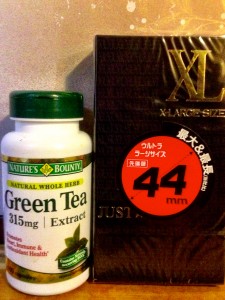Erectile dysfunction drugs such as Levitra combined with a polyphenol abundant in Japanese green tea may be highly effective in fighting cancer when consumed together.
In a study published last Friday in the Journal of Clinical Investigation, professor Hirofumi Tachibana of Kyushu University and fellow researches announced the results of their research, and explained how they made the finding. Several years ago Professor Tachibana’s research established that the major constituent of green tea known as ECCG suppressed cancer cell activity, but lacked potency. Tachibana suspected that the human enzyme PDE5 (phosphodiesterase 5)might be weakening the curative properties of ECCG. ECCG and other polyphenols have long been known to slow cancer growth but the mechanism is not completely understood.
Knowing that Levitra and other erectile dysfunction drugs block PDE5, Tachibana injected them into a mouse suffering blood cancer together with the active ingredient in green tea and found that the cancer cells stopped growing.
The Green-Tea/Levitra Martini was highly effective on pancreatic, stomach and prostate tumors. This is a good thing because if you’re going to be taking Levitra, you definitely want a healthy prostate. The possible side effect of a four-hour erection from taking Levitra is maybe something you don’t want but still it’s better than prostate cancer.
Malignant cells also vanished during the treatment of a mouse that had been implanted with human breast cancer cells. The study asserts that in-vitro experiments have proven the erectile dysfunction medicine and green tea combination treatment to be more effective than existing treatments.
In other words, Levitra synergizes with EGCG to induce cancer cell death. (It’s not known if the two taste good together.) The Green-Tea/Levitra Cocktail (or Martini if you like) was highly effective on pancreatic, stomach and prostate tumors. This is a good thing because if you’re going to be taking Levitra, you definitely want a healthy prostate. The possible side effect of a four-hour erection from taking Levitra is maybe something you don’t want but still it’s better than prostate cancer.
Kyushu University warned that people shouldn’t be mixing up their own batches of green tea and erectile dysfunction drugs at home, as this could be dangerous.
Although testing in human is not scheduled to begin next year, one thing is for sure: there are a lot of men who are going to misuse this study to justify drinking green tea.


Antioxidant levels key to prostate cancer risk in some men
Antioxidant levels key to prostate cancer risk in some men
Greater levels of selenium, vitamin E and the tomato carotenoid lycopene have been shown to reduce prostate cancer in one out of every four Caucasian males, or those who inherit a specific genetic variation that is particularly sensitive to oxidative stress, say US researchers.
Conversely, if carriers of this genetic variant have low levels of these vitamins and minerals, their risk of aggressive prostate increases substantially, as great as 10-fold, over those who maintain higher levels of these nutrients, they write in today’s issue of Cancer Research.
“This large prospective study provides further evidence that oxidative stress may be one of the important mechanisms for prostate cancer development and progression, and adequate intake of antioxidants, such as selenium, lycopene and vitamin E, may help prevent prostate cancer,” said Dr Haojie Li, a researcher at the Brigham and Women’s Hospital and Harvard Medical School.
The new findings are based on an analysis of 567 men diagnosed with prostate cancer between 1982 and 1995, and 764 cancer-free men from the Physicians Health Study.
The initial goal of this study was to assess the effect of aspirin and beta-carotene on men’s health. Li’s team decided to check for variants of the gene that codes for manganese superoxide dismutatase (MnSOD), an important enzyme that works as an antioxidant in human cells to defend against disease.
The MnSOD gene is passed from parents to offspring in one of three forms: VV, VA or AA.
“Compared with men with the MnSOD VV or VA genotype, people with the AA genotype seem to be more sensitive to the antioxidant status,” said Li. “Men with the AA genotype are more susceptible to prostate cancer if their antioxidant levels are low.”
The study’s results found that a quarter of the men in the study carried the MnSOD AA genotype, half carried the VA genotype, and the remaining quarter carried the VV genotype.
The results indicated that the VA and VV men were at equivalent risk for developing prostate cancer across all levels of antioxidants in their blood.
But compared to MnSOD VV or VA carriers in the lowest quartile of selenium levels, MnSOD AA males had an 89 per cent greater risk for developing aggressive prostate cancer if they had low blood levels of the mineral.
On the other hand, MnSOD AA carriers with high selenium – those men in the highest quartile – had a 65 per cent lower risk than the MnSOD VV or VA males who maintained low levels of selenium.
“The levels of selenium in the highest quartile of these men are not abnormally high,” Li said. “Our range is neither extremely high nor extremely low.”
While similar trends were observed for lycopene and vitamin E when tested independently, the contrast in relative risk was most pronounced for the men who had high blood levels for all three antioxidants combined, said the researchers.
“Among men with the MnSOD AA genotype, we observed a 10-fold difference in risk for aggressive prostate cancer, when comparing men with high versus low levels of antioxidants combined,”said Li. “In contrast, among men with the VV or VA genotype, the prostate cancer risk was only weakly altered by these antioxidant levels.”
“Our study, as well as many other epidemiological studies, encourages dietary intake of nutrients such as lycopene from tomato products, or supplements for vitamin E and selenium to reduce risk of prostate cancer,” said Li.
Prostate cancer is one of the biggest cancer killers in industrial countries and affects more than 500,000 men worldwide every year. This number is expected to increase with the ageing population.
Similar interactions between dietary antioxidants and the variations in the MnSOD gene have previously been linked to risk for breast cancer.
I’m confused by the photo.
Why Green Tea pills and a box of extra large condoms?
Because I didn’t have any Levitra around the house.